When the “hot money” gets antsy, a currency crisis morphs into a debt crisis.
You just don’t lend Argentina’s government money. Not in its own currency, because it relentlessly destroys that currency, and not in a foreign currency, because it will default on it. Lending money to Argentina is like trying to run across a 16-lane freeway with traffic zooming by at 70 mph. You just don’t do it. You might get through it. But there’s a good chance it’s going to cost you, and perhaps dearly, and you shouldn’t be surprised if it does.
But just after Argentina settled with the “holdouts” in 2016 on defaulted dollar-bonds dating from its last default, it sold new foreign-currency bonds, in all kinds of issuances, including in June last year $2.75 billion of 100-year bonds at a yield of 7.9% and in January this year $9 billion of bonds, composed of five-year bonds at a yield of 4.625%, 10-year bonds at a yield of 6%, and 30-year bonds at a yield of 7%.
The Ministry of Finance said the yields of the bonds sold in January – however juicy they may have seemed to NIRP and ZIRP-mauled investors – were the lowest in Argentina’s history. It had received $21.4 billion in orders for those $9 billion of bonds.
But these eager investors were trying to cross the 16-lane freeway. And now they act surprised that they got hit so quickly and before they could get out of those bonds.
Argentina’s peso is now in free-fall even though the Central Bank raised its interest rate three times last week to a stunning 40% to halt the plunge. Inflation is 25% and might get worse. And on Tuesday, the government began begging the IMF for a bailout to help deal with its currency crisis that is morphing into a dollar-denominated-debt crisis. Investors are ruing the day.
The daily chart below shows the cliff-dive Argentina’s peso has undertaken. Since early February, the ARS has fallen 16%, and since late April 11%, most of it over the last eight trading days, despite the efforts by the central bank to stem the fall by selling scarce foreign exchange reserves and by jacking up its policy rate to 40%. This morning, the currency is at a new record low of 22.68 ARS to the USD. Seen the other way around, 1 peso is now worth just 4.4 cents:
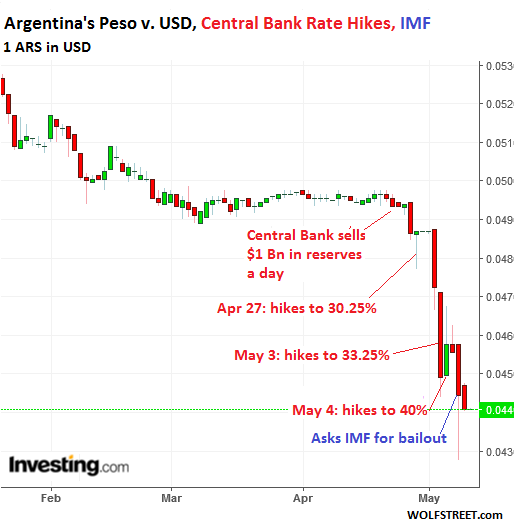
But it’s not just Argentina.
Former Federal Reserve Vice Chairman Stanley Fischer said on Wednesday that the turbulence from the rising dollar and from rising US interest rates that make the dollar more attractive hit emerging markets “a little more quickly than I had anticipated, and now that one sees it, one sees a couple of countries…which are closer to being in trouble and having to take strong policy measures.”
He didn’t specify which “couple of countries,” but one of them clearly is bond-investor darling, Argentina.
Will the situation be “stabilized,” he wondered. “Well, it requires a lot of people to do the right thing at the right time, and the right time is pretty soon for many of them.”
So OK, maybe it won’t be “stabilized.”
Among the other standouts, the Mexican peso has fallen 12.5% since February 20, half of that since April 19, to 19.56 pesos to the USD on Wednesday evening. Looking at it the other way, this daily chart shows the value of the MXN in USD, where 1 peso has fallen to just 5.1 cents:
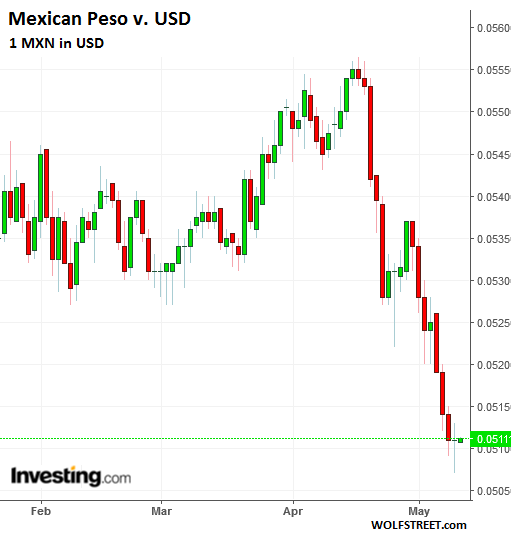
The Brazilian real has dropped 12% against the dollar since the end of January:
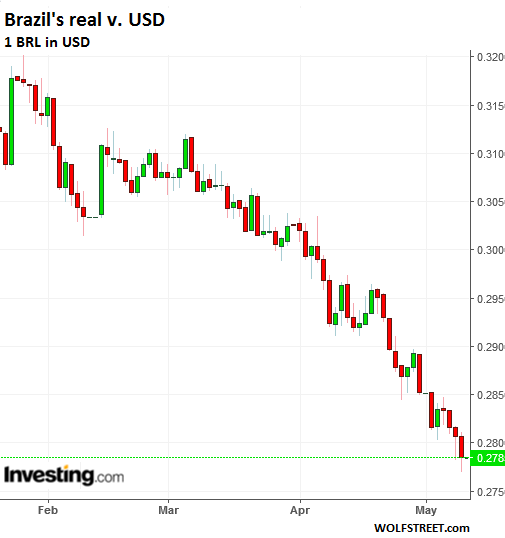
The Turkish lira has dropped 13% against the USD since early February:
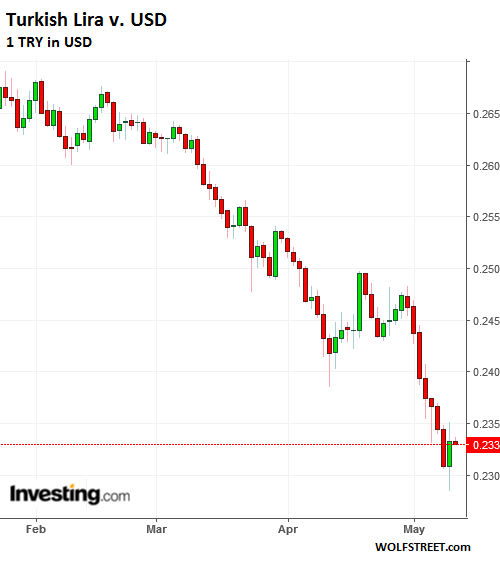
The Russian ruble has dropped 11.5% since early February, despite the surge in the price of oil since then:
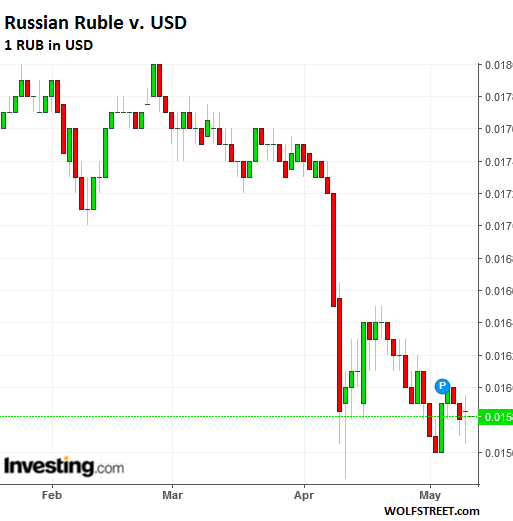
Other emerging-market currencies have not been hit as much. For example, the Indian rupee and the Indonesian rupiah are both down a little over 5% since early February. And clearly, there are going to be some bounces in the future, of the type that have already occurred, visible in the charts above.
After the mini-turmoil in 2015 and early 2016, the emerging markets once again became a sought-after destination for the hot money. Conservative sounding EM bond mutual funds touted huge yields to US-based investors, powered by dollar-denominated EM bonds, such as the 100-year bonds from Argentina. But these foreign currency bonds get increasingly difficult to service for these countries when the local currency crashes.
And that’s on the horizon now. That’s how a currency crisis becomes a debt crisis.
These open-end bond mutual funds have to sell the underlying bonds when bond-fund holders are getting cold feet and begin selling that mutual fund. Hedge funds have plowed into EM investments that are now looking iffy, and they’re trying to pull out. This type of selling in an illiquid market drives bond prices down further, and thus pushes yields up to where the affected countries have trouble selling new foreign-currency bonds to service the existing foreign-currency bonds. That’s when they go begging to the IMF, as Argentina is now doing.
These investors were betting on, and secretly praying for, a falling dollar and continued low interest rates, figuring that the Fed would never be able to raise rates beyond the first few tries. The dollar cooperated in 2017 by falling sharply, but in February this year it reversed course. And the Fed has been methodically tightening since late 2016.
But the dollar and rising US interest rates are just icing on the cake. Countries like Argentina and Turkey — whose fiscal and economic policies tend to melt down their own currencies — have their own massive problems, unrelated to the dollar and US interest rates, and neither the dollar nor US interest rates can be blamed for those problems, though they create a more unforgiving fiscal environment and narrowed the wriggle room.
Rising interest rates in the US has unleashed competition among banks for deposits for the first time in a decade, and the Fed is allowing it to happen. Read… “Act Now and Lock in” these Deposit Rates: Banking Cat-Fight Breaks Out Like We Haven’t Seen in Over 10 Years
Enjoy reading WOLF STREET and want to support it? You can donate. I appreciate it immensely. Click on the mug to find out how:
![]()


While the Argentinian exchange crisis may indeed be injuring the “investors,” the harm they are suffering is nothing compared to the damage being done to the People of Argentina, who in many cases are having their wages cut both through “labor flexibility” legislation and through inflation. While the people are not yet being forced to scavenge garbage to avoid starvation, infants and children are again malnourished, the old are again being denied adequate medical care and drugs, and the working age population are increasingly unemployed.
The IMF is again being asked for “assistance” which will be a fig leaf for “austerity” to again drive the country back to barter, and “Mingo” Cavalo is again making noises about joining the MMacri government, although he was an “advisor” during the NRP military dictatorship (30,000 disappeared) and architect of the Dollar:Peso parity scheme which collapsed the country in 2002, which assisted the looting of the country.
While the PJ [Peronist] party and the administrations of Kirchner and Fernandez had many problems, they were managing to jury rig solutions to some of the most critical, such as capital flight and tax evasion by the mega farms.
The Kirchner regime made it a crime for inflation numbers to be reported in the media, punishable by huge fines, disbanded the government agency responsible for generating inflation data, and printed money through the roof. They also made it virtually impossible for citizens to obtain foreign currency, for travel or any reason.
Capital flight occurs when businesses lose faith in the monetary system – it’s a symptom, not a cause of monetary problems.
The US exports inflation via having the reserve currency. No country wants to get too strong of a local currency, but they should embrace a strong currency. Problem is, with a strong currency you need to have wages drop, and the unions won’t allow it. Unions are not the origin of the problems but they block the solution, and thus they price labor out of the world market.
We are experiencing a Tower of Babel moment for world governments/bankers. The future is decentralized.
Dirty shirt bank robber!
Argentina is gaming the system and so are the banks that lend to them. Just like in the mortgage crisis, the banks and the politicians, knew this was going to end badly. Then the IMF can come to the rescue and take real resources from the people in exchange for SDRs. How many times do the people need to see this before they say “no mas.”
Exactly. Crisis my *ss.
It’s not banks that lent to them, it’s bondholders, including the diversified bond mutual fund in your portfolio.
And they’re bought by underfunded pension funds stretching for yield to cover their deficit, who are constrained by their rules to invest a certain percent of their money in bonds, so they buy this crap and cross their fingers.
After all, if you’re directing investments for a pension fund, would you rather get fired now because you can’t pretend the fund is solvent or invest in something really shaky and probably get fired in a year?
If they don’t mark the bonds to market they can pretend a little longer that they’re still worth face value and exchange rates don’t matter and they’re getting 7%.
I see this as a problem of incentives and regulations in the current regime of Wall Street.
Argentina offers bonds that no one expects them to pay. Big hedge fund/mutual fund companies buy these in droves purely as a pass-through for quick money.
The debt is re-packaged for investors as a “safe” diversified portfolio of “emerging market government debt.” Pension funds typically lack the kind of oversight and long term outlook that people would expect, and rating agencies are paid to rubber stamp the ratings.
I can’t blame Argentina for gaming the system – in doing so, their government certainly isn’t failing it’s responsibilities to its own people.
The real problem is the culture of ruthless Wall Street greed that exists today even stronger than it did with the fake AAA home loans before the 2008 crash. This behavior should be considered investor fraud and criminalized.
Dodd Frank made the system worse and did nothing to solve the underlying problems. All we can do is watch as the newest problems begin to unfold. And maybe purchase gold which is bound to go up once the next crisis sparks a market drop that inevitably causes the fed to reverse direction.
Banks sweep everything back to the fed , squirrel!
Rewind approximately 2 years ago, I visited Buenos Aires for the first time. It was unfathomable to me that they had “currency controls” and inflation spiking 20-30% a year. I couldn’t understand how the country functioned or even how people could run businesses or buy property. The property was all listed in US$. These obviously were only things I had read about that happened in that past like in Weimar Germany or in various Latin American countries. Of course, I vaguely remembered (as a child) Paul Volcker jacking up interest rates and my father having bonds that paid him ~15%. Long story short, this house of cards will not last forever. I just hope I am not around when the US$ blows up….
They are pretty good savers and the math is not in your favor?
Argentina should go to a gold or silver-backed currency and keep the economic hitmen from the IMF out of their country. Silver is literally in their name when translated from Spanish.
Great idea Perhaps Brazil and Chile could join in too and create a regional currency with real value
Yes, and Peru plus Bolivia. The whole continent could create the Euro of South America backed by silver and/or gold.
It’s South America we’re talking about here, not exactly the pinnacle of civilization.
Question is where would they get gold and silver? Do they still have any reserves?
It’s one of the world’s top producers of silver.
To say that Argentina is one of the world’s top producers of silver is a little bit of a stretch. They are not even in the top 10 any more.
https://investingnews.com/daily/resource-investing/precious-metals-investing/silver-investing/10-top-silver-producing-countries/
I have multiple extended family living in Argentina since the 1920s and the reality is it wouldn’t help one single iota if they did . Fact is 99.999% of all Argentina’s economic woes and problems all come down to their ongoing ( for decades if not a century ) excess corruption at all levels of government and finance
JMiller,
It depends on the year, but Argentina is always in the top 15.
https://www.ainsliebullion.com.au/gold-silver-bullion-news/world-top-20-silver-producers-e2-80-93-countries-and-companies/tabid/88/a/612/default.aspx
Mexico and Russia have no excuses for not backing their currencies with precious metals.
They actually have large known deposits of gold and silver that could be mined – especially in the Northeast bordering Brasil
Today, when global currencies have been taken to infinity & beyond, is a gold & silver backed currency anything more than a nickel & dime operation ???
It is a free for all.
And may the best man win.
Argentina’s government needs to build a few more hospitals & universities as security for borrowing.
Isn’t that why governments spend on healthcare & education & toll roads ???
So as to have real estate as borrowing power security.
Gold/silver bugs are living in a fantasy land. The total amount of gold and silver available today could never cover the total amount of today’s global trade volume.
Also, it’s not the concept of printed and electronic money that’s the problem, it’s the corrupt people in charge of it that’s the problem.
It’s Argentina we’re talking about here, not the reserve currency US dollar. The US dollar itself was convertible to gold on international exchange until 1971, and was backed by silver until it was removed from coins in 1964. US industry has been destroyed since the dollar was cut loose from any ties to metals.
I am not a gold bug and live in the real world.
It could be done quite easily just by raising the accepted value until a working equilibrium is reached – works better using grams instead of ounces as the metric system is better designed for small units of measurement
So a massive amount of paper will be backed i.e. CONVERTIBLE into gold or silver.
You can cover any amount of paper with gold depending on the price of gold in terms of the paper.
In ‘The Death of Money’ Rickards does a rough calculation of the price of gold needed to make the amount of US dollars ( I think just in the US) convertible and comes up with around 15 thousand $ or so per ounce.
But let’s say a new currency is issued and you only want to have it convertible at the current price around 1300 US$ per ounce.
Obviously you can’t print a bunch of money because everyone will rush to convert it, quickly exhausting your supply of gold.
Guess what? You must now spend within your means. A return to a gold or silver convertible currency would impose austerity far more drastic than any thing done by the IMF.
This is why any such scheme will by shot down by all politicos in the region with cries along the lines of ‘Thou shalt not crucify mankind on a cross of gold!’
These Argentina defaults are like clockwork. They never disappoint.
“Investors” have short memories.
Remember the time before last when MS loaned Arg the money to make the interest payments on bonds?
Look for something resembling ST stability with the investment banks and media touting the end of the crisis and the future so bright you have to wear shades in Argentina. While at the same time they and their clients will exit stage right. The crises in Arg are coming more closely together in terms of time? 100-year bonds to Argentina were never a good idea.
You’re right, next time they should issue 1,000 year bonds at 10%. And I’ll bet there are still some suckers that would buy it. :)
Of all the smart (?) people….
Why not simply pegging your national currency to the $ ?
Or like Panama call the dollar Peso ?
Couple of tough years ahead of you, but at least you KNOW
where you are heading….
Could it be ” national pride ” preventing this?
As mentioned above, look at Panama.
It is just a name.
Argentina default in 2001 was the result of making “one peso= one dollar” last for about a decade and following to the letter the IMF recipes.
The problem was keeping the peso and making it = 1 US$.
Either go 100% US$ throughout the economy or keep your own currency .
You can’t have both systems and expect it work – you’ll end up in a situation just like today and the numerous other times they defaulted.
Going 100% on a foreign currency you don’t control only ends in tears.
Well, been there, done that. Argentina used to peg the peso to the dollar 1 to 1. In 1999 still, you could go to an ATM in Argentina and withdraw cash either in pesos or dollars, at the same amount. So you’d get either 100 pesos or 100 dollars. When this system collapsed a year later, all heck really broke loose, banks were closed, people lost most of their savings in their dollar accounts, and so on. That’s when Argentina defaulted last time. People don’t have fond memories of this event.
Sorry to disagree here Wolf.
Read again: use the dollar and CALL it the Peso, like in Panama.
Argentina collapsed when they lifted the parity.
They never replaced their Peso for the US $.
My response that Argentina had already tried the peg was to your first suggestion: “Why not simply pegging your national currency to the $ ?”
Here is my response to your second suggestion: “Or like Panama call the dollar Peso ?”
Panama seceded from Colombia in 1903, with the backing of, or under pressure from, the US. The US then carved out an unincorporated territory of the US, called the “Canal Zone” which it returned to Panama in 1979. From the beginning (1903), Panama has been dollarized. So it just stuck to it. This is very different from where Argentina is today.
The national banks make obscene amounts of money from the staggered exchange rate between the national currency and the usd.
The charts with the steady long declines look fairly normal. The charts with the steep sudden declines look like currency speculators and others targetting the currency. Sitting on the sidelines with no inside info, the only thing to do is to sit back and watch who ends up making a big profit out of this. I can’t tell who it is, but history says they are almost certainly there.
https://www.bloomberg.com/news/articles/2018-05-09/bunkers-for-the-wealthy-are-said-to-hoard-10-billion-of-bitcoin
I think you covered it, ALL currencies are falling? Global currency conflagration? Well Argentina may have the answer.
I can’t believe Bloomberg keeps carrying the water of bitcoin promoters and scammers.
The title to that article reads more like something from The Onion.
It all has the faint aroma of CIA to it, to coincide with the hearings. This is US Treasury, money laundering regulations compliant. Do you suppose the government would give their blessing and then allow people to park money there anonymously, like Swiss Bank accounts? If Jim Rickards is who he says he is he would call out this scheme, as a cyber-warfare game or COIN ops of some kind. Should the cabal of global bankers lose control, it makes no sense for our government to not have their hands in this, just because Buffett calls it a double dose of rat poison. The list of contingency plans that never see the light of day grows each day. The MSM is a PSYOP bulletin board, its all in the timing and clearly a crisis in EM currency is brewing.
The AI’s writing most of the articles for Bloomberg are trained to always measure the news value of their production in terms of “advertising revenue per article”. They optimise the headings and content for: page-views, click-throughs, social media sharing and so on.
Those AI’s have learned that if the words “bitcoin”, “blockchain”, “muslim” or whatever are massaged into an article and it goes to ZeroHedge or Daily Mail, their KPI goes up and they get more silicon and electricity to play with!
The irony is that other AI’s will suck up all the swill right off the internet and trade on it, generating more Bloomberg AI-content on why that market did this or that :)
They probably plan on floating their own.
If I had to guess, I would say Bitcoin is a project of the NSA. The evidence points in this direction. To wit, who is “Satoshi Nakamoto” and why does he remain in the shadows and not bask in the fame? As to why the NSA would develop such a project, I don’t know. I can imagine it would be attractive as a way to funnel money in secret to various terrorist groups around the world, e.g. ISIS or the “White Helmets.”
As to why the NSA would develop such a project, I don’t know.
Every Bitcoin transaction is perfectly traceable and transparent for someone like the NSA. The NSA could perhaps think of the Bitcoin Blockchain as a huge distributed database of people who they “have something on” to later send those crude boyz in the CIA or the FBI round to ‘splain certain facts of life when the US government needs something done by someone disposable.
The NSA very much prefer those crims and terr’ists to be using the Hi-Tech Bitcoin over the Lo-Tech “Hawala” networks! Plays right into their strength, which is considerable.
The ideological of the bit-coiners are basically trying to do, in a very complicated fragile way, the same thing that some guys sitting in tents along the Silk Road figured out in about year 800: Banking without Banks!
https://en.wikipedia.org/wiki/Hawala
It’s funny listening to people who don’t understand much about BitCoin, pretend like they understand Bitcoin.
Myth: Bitcoin is anonymous
Fact: Bitcoin is pseudonymous, not anonymous. With enough work, IRL identities can be unraveled using social network analysis tools like Palantir.
Myth: Bitcoin was invented by NSA/CIA to spy on people
Fact: There is already a private electronic currency network called the SWIFT network which the NSA almost certainly owns lock, stock, and barrel. Why would they want to replace something that works great, with something new?
Myth: Digital currencies like Bitcoin are the next step in totalitarian global control!
Fact: 99.999% of the world’s circulating fiat currencies is, in fact, already digital. If you are worried about living in a cashless world–sorry, it already happened while you were busy watching TV.
Myth: Bitcoin (and other cryptocurrencies) are too volatile!
Fact: One BTC today is worth exactly what it always was worth, i.e., One BTC. As far as One BTC’s value in fiat dollars, well, over the long term, it just keeps appreciating. I guess if owning an appreciating currency bothers you, and you you prefer owning a depreciating currency like the dollar which has an unblemished track record of steady depreciation each and every year, then hey, more power to you.
I could go on but that’s enough for today.
Kate Hykes,
This was funny, got a good chuckle out of it: “As far as One BTC’s value in fiat dollars, well, over the long term, it just keeps appreciating.”
Kate Hykes,
“Fact: One BTC today is worth exactly what it always was worth, i.e., One BTC.”
And one unicorn fart is always worth exactly one unicorn fart. LOL. Do you have Satoshi’s phone number? I would like to ask him a few questions about Bitcoin.
I live in a developing market that saw a currency plunge of 50% (yes Egypt) in the past year. Actually, —- Egypt has been the best performing stock market in the world so far in 2018. Good times if flush with USD$. — not so good for locals stuck with assets that lost 50% of value over night.
This means now would be a good time to buy property in Argentina?
Not in the city of course, out in some fertile, well watered place on the Pampa.
I would have to say YES! If using Dollars….of course, you’re essentially betting the country has hit rock bottom and will not get any worse. It’s a high risk gamble, but that’s how fortunes are made.
I’d like to take the occasion to thank Wolf Richter for the precious public service he’s doing.
These EM bonds have been hawked very aggressively by our Euro banks as “cannot-go-wrong” investments. Of course not all the bonds are complete rubbish: issuers with large euro and dollar revenues, such as Mexico’s Grupo Bimbo, will have little or no trouble keep servicing their debts and if you bought one of the much-hyped Turkish lira bond issues (up to 11% yield! Get them while they are still hot!) you are still getting paid, albeit your liras are now worth 20% less against the euro than six months ago. But the rest are about to cross that 16-lanes highway, and rush hour is approaching.
Customers were not informed about the much increased default risk should these EM currencies start tanking, like they periodically do.
Mind most people are not like us: they just look at the yield and, at very most, fees before committing. They know little outside of what mainstream media say, and these media have been completely ignoring any form of financial risk for a few years now. Their business seems to be shilling risky or even dubious financial products like they were T-bills these days.
While Argentina, like a glamorous tango dancer, gets all the attention I am personally much more interested in Turkey.
Turkey has become somewhat of a little China over the past few years: they are even at second place behind the Celestial Kingdom in the EU Trade Commission’s list of countries with pending anti-dumping violation investigations.
This phenomenal growth has a lot to do with financial and monetary policies: many EU banks have an extremely heavy footprint in Turkey. Many of those construction cranes going up in Izmir and Istabul are financially backed by bonds sold to EU investors driven insane by financial repression. And Turkish outsourcing queens such as Otosan and Tofas got a major boost from those “bizarre” fiscal and monetary policies the Turkish government (like governments everywhere) blames on factors outside its own control.
EM bond issuers, like investors everywhere, have been fighting the Fed for too long. You don’t do that and get away with it because you never fight the Fed no matter how asinine its policies are and what problems they cause. Now they are about to be presented the bill.
Fight the FED? Like attempting to bargain with the (legal) mafia.
Fighting the Fed in investment parlance refers to assuming you can outsmart them by being “contrarian” or, like it is happening right now, blowing off their stated goals and assuming the folks at Eccles Building will just cater to your whims.
In the end you get crushed by sheer mass.
That’s why those cash burning machines like Uber, Netflix and Tesla are either frantically selling bonds while rates are still low (albeit rising) or even eyeing euro-denominated emissions.
If you don’t like what the Fed is doing or do not feel the environment they created is suited to you as an investor, there are other alternatives out there. When Janet Yellen literally lulled to sleep dollar markets, Asia was the place to be. China and Japan rewarded me more than I expected.
And if you have the nerve and reflexes for it, there are always emerging markets.
The IMF is like a bank, it only loans if they deem you don’t need it. See Greece.
This is another excellent article, Wolf. Thank you.
The concepts behind the bond buying and currency turmoil are both explained in clear language which can easily be understood.
In an economic world where yield is in very short supply, “investors” are prepared to risk default to try to secure that precious commodity known as yield.
Contagion and yield. One is going to beget the other.
Please keep up the good work, Wolf.
All Fiat currency is debt. All Fiat is borrowed into existence. When it’s payed back it gets destroyed. Hence there is no such thing as money(real). Since it gets destroyed after being borrowed into existence. So perpetual debt has to be for money to exist at all.
If you don’t like your perpetual-debt non-money fiat currency, send it to me.
If I have no debt but do have lotsa money and people let me buy things, how can that be? Should I end it all now or just wait to see what happens?
All money ultimately has no value of and by itself, even gold and silver (unless you like wearing it), it’s value comes from what you can exchange it for. The electronic money in my bank account has value since I can exchange it for things that I need. And in a real crisis situation I’d much rather have food storage than money either paper, gold or silver–it tastes much better.
I’ve noticed my pantry fills up when I feel less financially secure. Right now, I could feed an army.